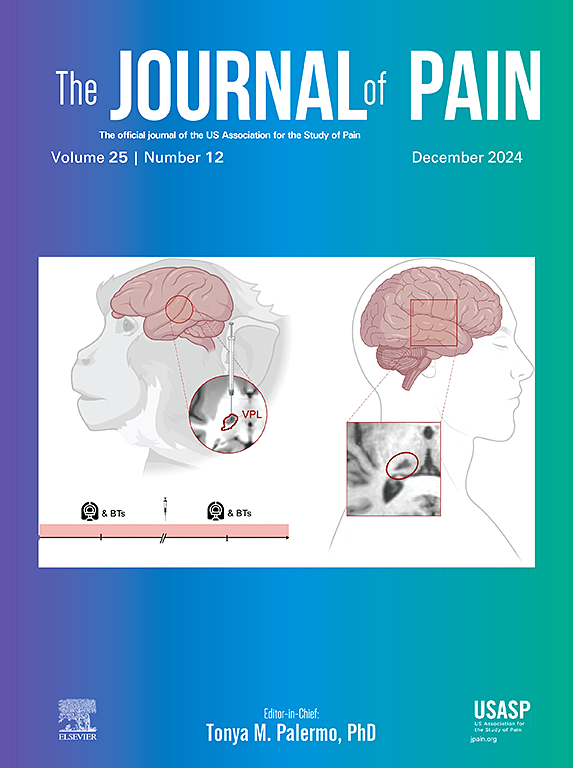暴露于围产期创伤改变青春期大鼠前额叶皮层和下丘脑的伤害感受和基因表达。
IF 4
2区 医学
Q1 CLINICAL NEUROLOGY
引用次数: 0
摘要
围产期是神经发育的关键时期,使大脑对经验高度敏感。这一时期的创伤,如亲密伴侣暴力和早期生活压力/忽视,会对身心健康结果产生负面影响,包括增加患慢性疼痛的风险。虽然表观遗传程序可能起作用,但驱动围产期创伤和不良健康结果之间关系的机制尚不完全清楚。因此,我们探讨了围产期创伤(子宫内暴露于IPV和/或早期生活忽视)与公鼠及其青春期后代的社会情感功能、伤害敏感性和前额叶皮质(PFC)和下丘脑转录组学变化之间的关系。在怀孕期间,大鼠被随机分配到IPV(即合并轻度创伤性脑损伤和勒死)或假手术。出生后,后代随后被分配到早期生活忽视或控制范式。在青春期,后代接受足底切开或假损伤。围产期创伤与外科手术相结合时,以性别依赖的方式改变了伤害感觉和情感功能。我们发现了与坝的PFC和下丘脑DNA转录和表达相关的转录组学变化。对后代转录组的检查强调了免疫调节损伤、应激反应功能障碍以及小胶质细胞激活。我们还发现了与慢性疼痛相关的基因表达改变。这表明,围产期创伤改变后代的行为,包括伤害敏感性。我们深入了解了导致疼痛慢性化的机制,从而为未来针对预防和治疗策略的研究提供了信息。观点:围产期创伤会损害后代的认知、社会情感和疼痛处理,同时也会引起母亲和后代基因表达的变化。这些发现强调了慢性疼痛风险代际传递的可能机制,并提供了可能逆转围产期创伤引起的表观遗传变化的治疗靶点。本文章由计算机程序翻译,如有差异,请以英文原文为准。
Exposure to perinatal trauma modifies nociception and gene expression in the prefrontal cortex and hypothalamus of adolescent rats
The perinatal period encompasses a critical window for neurodevelopment that renders the brain highly responsive to experience. Trauma, such as intimate partner violence (IPV) and early life stress/neglect, during this period negatively affects physical and mental health outcomes, including increasing ones risk for chronic pain. Although epigenetic programming likely contributes, the mechanisms that drive the relationship between perinatal trauma and adverse health outcomes, are not fully understood. Therefore, we explored the relationship between perinatal trauma (in utero exposure to IPV and/or early life neglect) and socio-emotional functioning, nociceptive sensitivity, and transcriptomic changes within the prefrontal cortex (PFC) and hypothalamus in dams and their adolescent offspring. Rat dams were randomly assigned to an IPV (i.e., combined mild traumatic brain injury and strangulation) or sham procedure during pregnancy. Following birth, offspring were subsequently assigned the early life neglect or control paradigm. In adolescence, offspring received a plantar incision or sham injury. Perinatal trauma altered nociception and emotional functioning in a sex-dependent manner when combined with the surgical procedure. We identified transcriptomic changes related to DNA transcription and expression within the PFC and hypothalamus of the dams. Examination of the offspring transcriptome highlighted impairment in immune regulation, dysfunction in stress-reactivity, as well as microglia activation. We also identified altered expression of genes associated with chronic pain. This demonstrates that perinatal trauma modifies offspring behaviour, including nociceptive sensitivity. We provide insight into the mechanisms that contribute to the chronification of pain, thereby informing future research targeted at the generation of prevention and therapeutic strategies.
Perspective
Perinatal trauma impaired cognitive, socio-emotional, and pain processing in offspring, while also inducing changes in gene expression, in both mothers and offspring. The findings highlight possible mechanisms responsible for intergenerational transmission of risk for chronic pain and provide targets for therapeutics which could potentially reverse perinatal-trauma induced epigenetic change.
求助全文
通过发布文献求助,成功后即可免费获取论文全文。
去求助
来源期刊

Journal of Pain
医学-临床神经学
CiteScore
6.30
自引率
7.50%
发文量
441
审稿时长
42 days
期刊介绍:
The Journal of Pain publishes original articles related to all aspects of pain, including clinical and basic research, patient care, education, and health policy. Articles selected for publication in the Journal are most commonly reports of original clinical research or reports of original basic research. In addition, invited critical reviews, including meta analyses of drugs for pain management, invited commentaries on reviews, and exceptional case studies are published in the Journal. The mission of the Journal is to improve the care of patients in pain by providing a forum for clinical researchers, basic scientists, clinicians, and other health professionals to publish original research.
 求助内容:
求助内容: 应助结果提醒方式:
应助结果提醒方式:


